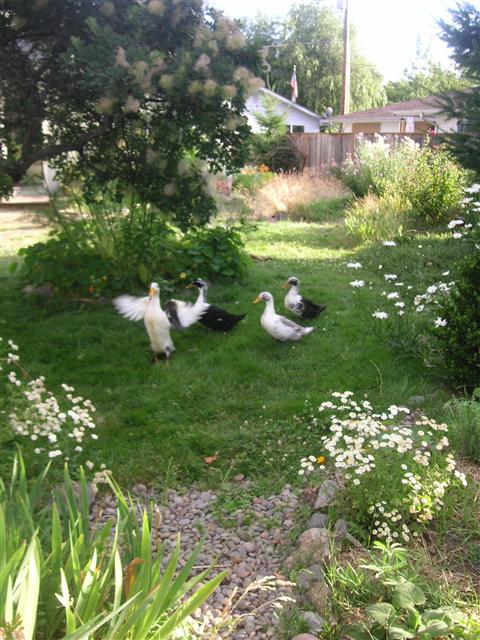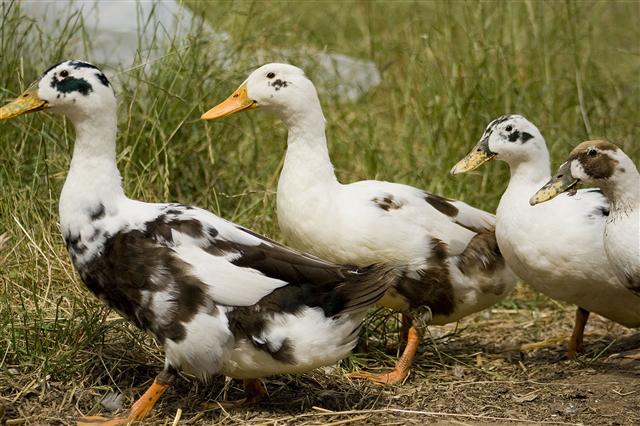|
|
| SOME DUCKFACTS About ducks in general
- Ducks are not meant to be on a 100% pasture but more with woodland/grassland type setting. We encourage them to use their built nests for their eggs which always doesn't seem to happen. We are experimenting with different methods and rotations currently to keep them out and let them lay only when they need.
- Ducks need to be locked away at night to protect them from predators of all kinds such as raccoons, skunks, wild and neighborhood dogs, unless you have a livestock guardian dog on full time duty.
- Night time houses must be heavily constructed, have sturdy floors, be draft free but well ventilated. Any areas with chicken wire must be ¼ inch to prevent crafty raccoon arms from reaching in, remember these are strong animals with an appetite.
- For optimum protection we have brought two Great Pyrenees Guardian dogs to our farm to live with our ducks full time, you can read more about our livestock guardian dogs here. Now we have six.
- Our ducks are supplemented with a nutritionally balanced custom organic feed with NO corn, and NO GMOs and NO animal products. They are supplemented with various vegetables from our garden, as well as dug up worms for an occasional treat.
- From the minute they hatch they are bonded with vocal encouragement and interaction. We believe that properly cared for and socialized ducklings make happier and easier going ducks. This and better understanding of your ducks needs and likes will translate to more consistent heavy egg production.
SOME QUESTIONS TO ASK WHEN BUYING AND RAISING DUCKS :
* When Can I put them outside?
* When do they become completely feathered?
* When can I give them swimming water?
* When do they start laying eggs?
* Will poultry lay eggs without any males present?
* How can I get them to lay eggs in nests and sit on them?
* What should I do with an egg I found?
* Do I have to use an incubator to hatch?
* How do I know if and egg is fertile?
* Can I help a bird out of the shell when it hatches?
* What is the life expectancy of a duck ?
* How do I tell males from females?
* How many males and females should I have?
 Q: When can I put them outside? Q: When can I put them outside?
A: WARM WEATHER
This depends on the weather. If it is warm, they can probably venture outside during the warmer part of the day at one week of age. Keep them in a small area so they can get back to a warm, protected area if they need. They need to be protected from rain until they are about six weeks of age when they are almost completely feathered. If the weather is not warm, you may need to keep them confined until they are six to seven weeks of age. The best thing is to watch them. If they appear cold or huddle together, bring them back inside.
Q: When do they become completely feathered?
A: 7 WEEKS
By seven weeks, they should be covered with feathers. Rouens and Mallard males will not get their brightly colored feathers until about 15 weeks of age. Until then, males and females look alike.
Q: When can I give them swimming water?
A: ABOVE 80 DEGREE WEATHER
The safest is to wait until they are five weeks or more of age. Oftentimes they can handle it at an earlier age if provided water that is easy to enter and exit, it is shallow and the rest of their pen is dry.
Q: When do they start laying eggs?
A: 6 MONTHS
Ducks are sexually mature at 20-24 weeks of age. If they have the correct feed and lighting, they will start laying then. Otherwise they will start as soon as the days begin to lengthen and it warms up in the spring. When they start mating and laying, make sure you switch to a breeder/layer feed with more protein, calcium and vitamins.
Q: Will poultry lay eggs without any males present?
A: YES
Yes. The eggs will not be fertile.
Q: How can I get them to lay eggs in nests and sit on them?
A: THEY WILL BY THEMSELVES
The best nest provides protection from rain and sun and gives the female a sense of security. It should have three walls, a roof and a low front to keep the nesting material in the nest box. Fill it with straw, wood shavings or rice hulls. You can put a chicken or fake egg in it to further entice them. You cannot force them to sit on their eggs. The Ancona, Muscovy, Mallard and Khaki Campbell are very good at sitting on their own eggs. For the other breeds, it depends on the individual bird. do not start sitting on the eggs until the nest is full, normally 7-15 eggs.
Q: What should I do with an egg I found?
A: INCUBATE IT FOR FUN, UNLESS ITS WILD THEN LEAVE IT BE
If you want to hatch it, put it in an incubator or under a sitting hen. It is very difficult to incubate and hatch an egg with only a light bulb or heating pad. Remember, if the egg was not in a nest, it had probably not been sat on and no development had occurred since it was laid.
Q: Do I have to use an incubator?
A: NO MAKE ONE YOURSELF, REALLY IT IS EASY!
The best is to use the mother or a broody chicken. Second best is an incubator but success can vary tremendously. You can try to make your own incubator but it is more economical to purchase an incubator.
Q: What is the normal incubation period?
A: AVERAGE IS 28 DAYS
Mallards 26.5 days
Muscovy 35 days
Runners and Crested 29 days
Anconas and all other ducks 28 days
Chinese and African geese 31 days
All other geese 30 days
Q: How do I know if an egg is fertile?
A: CANDLE THE EGG !
You need to shine a bright light through the egg in a dark room. If done infrequently, you can use a flashlight. By seven days, you should see a darker yolk, veins under the shell and the beginnings of an embryo.
Q: Can I help a bird out of the shell when it hatches?
A: TRY NOT TO IF POSSIBLE
Once the duckling has started to break the shell in a circle around the large end of the egg, you can. But if it is just making a hole in one spot, you probably shouldn't yet. Wait until it has broken the shell and turned several times inside the egg. Sometimes the bird will stick to the shell and cannot progress. You have to help them then but if you start to see bleeding, stop and wait a couple of hours before helping again.
Q: What is the life expectancy of a duck or goose?
A: ABOUT 8 YEARS
Ducks can live to 7-10 years and geese normally live 10-15 years. The main cause of death seems to be dogs or predators.
Q: How do I tell males from females?
A: 7 WEEKS THEY SOUND DIFFERENT, OR HAVE AN EXPERT SEX THEM
For ducks, the male is slightly larger with a heavier neck and head. They will also develop a curly feather on their tail. The easiest way to tell them apart is with their voice. Males have a deep, raspy voice like a cough "wough". Females have the typical "QUACK". The only way to know for sure is to vent sex them which is difficult without a bit of training, we dont suggest trying this.
Q: How many males and females should I have?
A: 1 MALE TO 6 FEMALES
For ducks it depends on the space they have and the flock size. If you have 10 or less, you can have pairs. Over this, you need to provide plenty of room or reduce the number of males. Unless you have a large pen with plenty of hiding areas, the ratio should be one male for every three to five females if your flock is over 25 or 30. The problem with too many males is they will become very aggressive sexually and will harm some of the weaker females.
| |
|
|